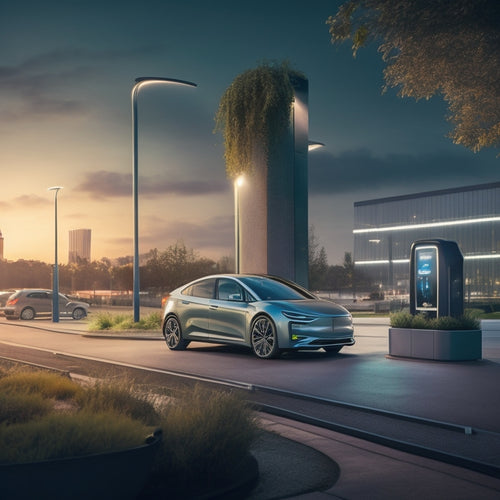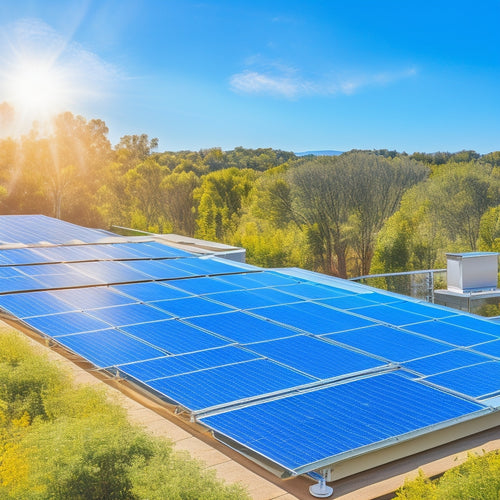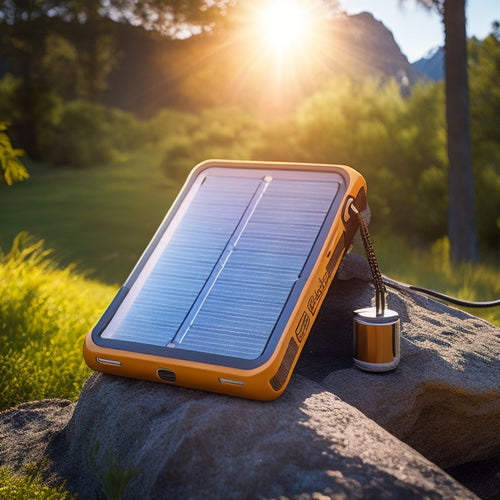
Small Home Battery Backup
Share
You're looking for a reliable and efficient way to safeguard your home against power outages, and a small home battery backup system can be the solution you need. With the ability to store excess energy generated by solar panels, you can reduce energy waste and rely less on the grid during outages. A deep cycle battery design is essential for overall performance and lifespan, and understanding factors like depth of discharge, maintenance practices, and compatibility with existing systems is key. By evaluating your power requirements and prioritizing devices to power during an outage, you can guarantee reliability and efficiency. Now, learn how advanced battery chemistry and optimized energy usage can further enhance your backup system's performance.
The Essentials
- Small home battery backup systems provide a reliable and sustainable alternative to traditional fossil fuel-based generators during power outages.
- Energy efficiency gains can be achieved by storing excess energy in small home battery backup systems, reducing reliance on the grid.
- Battery life expectancy is affected by factors such as depth of discharge, maintenance practices, and temperature, making proper selection and care crucial.
- Assessing power requirements and prioritizing devices to power during outages ensures the backup system meets essential energy needs efficiently.
- Advanced battery chemistries, such as lithium-ion and flow batteries, offer improved performance, longer lifetimes, and reduced maintenance in small home battery backup systems.
Safeguard Against Power Outages
You're likely aware that power outages can be triggered by various threats, including severe weather, utility grid failures, and physical damage to power lines.
These outages can be particularly problematic for homeowners who rely on critical systems, such as reliable battery backup for home, to maintain safety and comfort.
Additionally, they can also result in food spoilage and data loss due to power surges.
To safeguard your home against these unpredictable events, you'll want to evaluate backup power options that can seamlessly take over when the grid goes down.
Power Outage Threats
Power outages can strike at any moment, catching homeowners off guard and leaving them vulnerable to a multitude of threats. You're not just dealing with inconvenient darkness; you're facing potential safety risks, property damage, and even health hazards. Without a plan, you're at the mercy of the grid, waiting for utility crews to restore power.
Additionally, the loss of power can also result in costly losses due to food spoilage and damage to electronics, highlighting the significance of Emergency Power Backup solutions. In addition, households with specific needs, such as those relying on medical equipment, can benefit greatly from a dependable power storage system.
During an outage, your home's security system may be disabled, making it an attractive target for intruders. Medications that require refrigeration can spoil, and food can spoil, leading to costly losses.
In extreme temperatures, pipes can freeze or burst, causing thousands of dollars in damages. Furthermore, an outage can disrupt your communication systems, leaving you isolated and without access to crucial information.
It's important to prioritize outage preparedness and emergency planning to safeguard your home and family. By understanding the threats associated with power outages, you can take proactive steps to mitigate risks and guarantee your independence.
Backup Power Options
When it comes to safeguarding against power outages, having a reliable backup power option is essential. You need a system that can provide continuous power supply to your home, even when the grid is down.
With the advancement of Solar Power Backup systems, homeowners can now enjoy a reliable source of backup power during outages, reducing their reliance on noisy, polluting generators. There are several backup power options available, each with its own set of advantages and limitations.
You can opt for traditional fossil fuel-based generators, which are widely available but have high operating costs and environmental drawbacks. Alternatively, you can consider renewable integration, such as solar-powered systems, which offer a cleaner and more sustainable solution.
However, these systems often come with higher upfront costs and may not provide the same level of power output as traditional generators.
Cost considerations are critical when selecting a backup power option. You'll need to weigh the initial investment against the potential savings from reduced energy bills and the value of having a reliable power supply during outages.
Additionally, you should also consider the maintenance requirements and lifespan of the system. By evaluating these factors, you can choose a backup power option that meets your energy needs and fits your budget.
Reduced Energy Waste
You can achieve energy efficiency gains by storing excess energy generated from your solar panels or wind turbines in your small home battery backup system, reducing the amount of energy wasted during transmission and distribution.
With solutions like the Tesla Powerwall and LG Chem RESU home battery storage cost, you can optimize your energy usage and reduce waste.
This approach also helps minimize power loss, which occurs when energy is transmitted over long distances or through inefficient grids.
Energy Efficiency Gains
About 30% of the energy generated by your solar panels is typically lost due to inefficient energy storage and grid transmission. This loss can be considerably reduced with a small home battery backup system. By storing excess energy generated during the day, you can use it at night or during power outages, reducing your reliance on the grid and minimizing energy waste.
This approach not only saves you money but also contributes to energy conservation and sustainable living.
With a battery backup system, you can optimize your energy usage and reduce your carbon footprint. You'll have more control over your energy consumption, allowing you to make conscious choices about when and how you use energy.
Additionally, this system enables you to take advantage of time-of-use pricing, where you can store energy during off-peak hours and use it during peak hours, further reducing your energy costs.
Lowered Power Loss
How much energy is actually being wasted due to inefficient energy storage and transmission? The answer might surprise you. Traditional grid-tied systems often experience significant power loss during energy transmission, resulting in reduced efficiency and increased energy bills.
In contrast, small home battery backup systems equipped with smart technology minimize power loss, ensuring that the energy you generate is the energy you use.
By integrating advanced energy conservation measures, these systems reduce energy waste and optimize your energy consumption. For instance, smart inverters and power conversion systems enable efficient energy transfer, minimizing losses during charging and discharging cycles.
Additionally, advanced battery management systems monitor and control energy flow, preventing unnecessary energy drain.
With a small home battery backup, you're in control of your energy usage. You can store excess energy generated during the day for use during the night or during power outages.
This means you'll rely less on the grid, reducing your energy bills and carbon footprint. By investing in smart technology, you're taking a significant step towards energy independence and a more sustainable future.
Deep Cycle Battery Design
You'll want to think about the design of your deep cycle battery, as it greatly impacts the overall performance of your small home battery backup system.
When selecting a battery, it's vital to evaluate the type of lithium ion battery for solar system that best suits your needs, as well as the compatibility with your existing solar panel battery and inverter setup.
The battery life expectancy, for instance, is heavily influenced by the depth of discharge (DOD) it's subjected to, with shallower cycles generally leading to a longer lifespan.
As you evaluate different battery options, it's important to understand how cycle depth affects the overall health and longevity of your battery.
Battery Life Expectancy
What sets the lifespan of a deep cycle battery apart from its counterparts is its ability to withstand the rigors of repeated charge and discharge cycles. You expect your battery to provide reliable power backup for years to come, and understanding the factors that affect its lifespan is essential. Battery maintenance plays a significant role in determining how long your deep cycle battery will last. Regular checks on electrolyte levels, charging, and equalization can help prevent premature wear.
Several lifespan factors come into play, including:
| Factor | Impact on Lifespan |
|---|---|
| Depth of Discharge (DOD) | Higher DOD reduces lifespan |
| Temperature | High temps reduce lifespan, low temps increase it |
| Charge/Discharge Cycles | Increased cycles reduce lifespan |
| Maintenance Quality | Poor maintenance reduces lifespan |
| Battery Quality | Low-quality batteries have shorter lifespans |
Cycle Depth Matters
As you examine the factors influencing your deep cycle battery's lifespan, it becomes clear that the depth of discharge (DOD) plays a significant role in determining its overall performance.
The DOD refers to the percentage of the battery's capacity that's used during each cycle. A deeper DOD means you're using more of the battery's capacity, which can impact its cycle performance.
When you consistently discharge your battery to 80% or more of its capacity, you'll reduce its overall lifespan. This is because deeper discharges cause more stress on the battery's internal components, leading to degradation over time.
On the other hand, limiting your DOD to 50% or less can help extend the battery's lifespan.
In energy storage systems, it's crucial to strike a balance between meeting your energy needs and preserving your battery's health.
By understanding the impact of DOD on your deep cycle battery's performance, you can make informed decisions about your energy usage and optimize your system for maximum efficiency and longevity.
Check Your Power Requirements
You'll need to assess your power needs to determine the required capacity of your small home battery backup system. This involves identifying the devices you want to power during an outage and calculating their total wattage.
Residential energy storage systems, like the Tesla Powerwall, can provide a reliable source of backup power top rated battery storage.
You'll also need to prioritize these devices, so you can allocate power accordingly in case your system's capacity is limited.
Power Needs Assessment
During a grid outage, your small home battery backup system must provide sufficient power to support your essential appliances. To determine the required power output, you need to evaluate your home energy needs.
Start by identifying the appliances you want to power during an outage, such as refrigerators, lights, and medical equipment.
Next, calculate the total power requirement of these appliances. You can find the power rating of each appliance on its nameplate or in its user manual. Add up the power ratings to get the total power requirement. This will give you an idea of the minimum battery capacity required to support your essential appliances.
For instance, if you want to power a refrigerator, lights, and a laptop, your total power requirement might be around 1,500 watts. To guarantee your battery backup system can provide this power, you'll need a battery with a capacity of at least 3,000 watt-hours (Wh).
A higher capacity battery will provide more power and longer backup times. Accurately evaluating your power needs is vital to choosing the right battery capacity for your small home battery backup system.
Device Priority Ranking
Evaluating your power needs is just the first step in designing an effective small home battery backup system. Now it's time to prioritize which devices you want to back up during an outage. This is essential, as you'll need to determine which appliances are vital and allocate your battery power accordingly.
Create a list of all the devices you want to power during an outage, including lights, refrigerators, computers, and medical equipment. Rank them in order of importance, considering factors like food spoilage, safety, and communication. You may need to make some tough decisions, but this will guarantee your most critical devices stay powered.
When examining device compatibility, consider the wattage and voltage requirements of each device. This will help you determine which ones can be safely connected to your battery backup system.
Load management is also key, as you'll need to balance the power demand of your devices with the capacity of your battery. By prioritizing your devices and managing your load effectively, you'll be able to enjoy a reliable and efficient small home battery backup system.
Longer Cycle Life Guaranteed
You'll want a battery backup system that can withstand the demands of repeated charging and discharging without sacrificing performance.
Advanced battery chemistry is key to achieving this, as it enables batteries to handle more cycles before capacity starts to degrade.
Advanced Battery Chemistry
Advanced battery chemistry is the cornerstone of small home battery backup systems, as it enables longer cycle life guarantees.
You're likely familiar with traditional lead-acid batteries, but advancements in lithium-ion and flow batteries have revolutionized the industry.
Lithium advantages include higher energy density, longer lifetimes, and reduced maintenance.
Flow batteries, on the other hand, store energy in a liquid electrolyte solution, allowing for flexible capacity and scalable design.
These advanced chemistries enable you to store more energy, for longer periods, with reduced degradation.
This means you can enjoy uninterrupted power during outages, while also reducing your reliance on the grid.
With advanced battery chemistry, you can rest assured that your small home battery backup system will provide reliable, long-lasting performance.
You'll have the freedom to live off-grid, or simply have peace of mind knowing you're prepared for whatever the grid may throw your way.
Frequently Asked Questions
Can I Use a Small Home Battery Backup for My Entire House?
You're wondering if a single backup system can power your entire house. While it's feasible, you'll need to evaluate the cost efficiency and power capacity of the system, ensuring it can handle your home's energy demands without breaking the bank.
Are Small Home Battery Backups Compatible With Solar Panels?
When you integrate solar panels with a battery backup, you'll find most systems are compatible, allowing you to optimize energy storage efficiency and maximize your renewable energy freedom, but it's essential to verify the system's compatibility and configuration for seamless solar panel integration.
Do I Need to Maintain My Small Home Battery Backup Regularly?
Don't let your power storage sleep on the job! You'll need to regularly inspect and update your system to maximize battery lifespan. Follow essential maintenance tips, like checking voltage and electrolyte levels, to guarantee your backup remains reliable and efficient.
Can I Install a Small Home Battery Backup Myself?
You can attempt a DIY installation, but it's vital you accurately determine your energy needs for proper battery sizing to guarantee a safe and efficient system, considering factors like load calculations and wiring configurations.
Are Small Home Battery Backups Covered by a Warranty?
When purchasing a product, you'll want to know if it's backed by a warranty. Typically, warranties have a specific duration, say 5-10 years, and outline coverage limitations, such as defects, malfunctions, and performance issues, giving you peace of mind and protection for your investment.
Final Thoughts
With a small home battery backup, you're anchored to a reliable source of power, no matter the storm. By reducing energy waste and utilizing the potential of deep cycle battery design, you're safeguarding against power outages and ensuring your essential appliances stay online. Calculate your power requirements, and let the guarantee of a longer cycle life be your guiding light. Like a lighthouse in the dark, a small home battery backup shines bright, illuminating a path to energy independence.
Related Posts
-

Solid State Batteries in Electric Vehicles
Solid-state batteries revolutionize electric vehicles by offering a longer lifespan and higher energy density than tr...
-

What Types of Solar Energy Devices Are Available
You'll find several types of solar energy devices available today, each customized to different energy needs. Photovo...
-

Fastest Solar Chargers for Emergency Power
When choosing the fastest solar chargers for emergency power, you need to focus on features like rapid charging capab...


